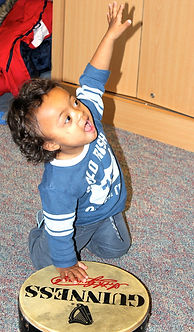Richard's Music
Therapy
Richard's Music Therapy is named after a boy who received our
music therapy intervention some years ago. Just like Richard, all of
the children we work with have special needs and benefit enormously
from music therapy. Our vital service sits within the charity
Cambridgeshire Culture Foundation, based at Cambridgeshire Music
in Histon.
We can only carry out our work helping children and families in
Cambridgeshire thanks to the wonderful support we receive from
local people and organisations.
Our music therapy provides opportunities for self-expression and communication through shared interaction using a variety of musical instruments and spontaneous vocal sounds. The ability to respond and experience music is an inborn quality that usually remains unimpaired by disability, injury or illness and is not dependent on musical training. Through music-making children can develop the ability to express a variety of different emotions. Many children find it easier to express themselves through the non-verbal medium of music. Music therapists are trained musicians and qualified arts therapists, registered with the Health Professions’ Council.
The child, parent/carer and therapist all take an active part by playing, singing and listening. It is not necessary for the parent to have had any musical training. The therapist will encourage the child to experiment with percussion, other instruments and their own voice to explore the world of sound and to create their own musical language. The music played and the content of each session will therefore vary, depending on the individual needs of the child. Sessions last for about 30 minutes, leaving time at the end for feedback, discussion and review with the child's parent/carer.
What are the aims for music therapy?
Music therapy aims might be to encourage and develop:
-
Musical and playful interactions
-
Non-verbal communication
-
Vocalisations and verbal expression
-
Communication skills and listening
-
Turn-taking and sharing control
-
Confidence and self-esteem
-
An alternative means of self-expression
-
Extended periods of attention and concentration
-
Positive and enjoyable experiences for the child and their family
Many parents have commented that music therapy sessions provide a positive experience for them and an opportunity to think about and encourage what their child can do, rather than focusing on any disabilities.
Music therapy referral and assessment
Referrals for music therapy are usually made by the health
professionals working with the child, either at the Child
Development Centre, Addenbrookes Hospital, the child’s school or in the
community; for example the pre-school teacher, teacher, paediatrician,
speech and language therapist, or psychologist.
Richard’s Music Therapy also enables music therapists based
at Cambridgeshire Music to take referrals from music therapists in the county
who have long waiting lists. The child and parent may then be invited
to attend two 30-minute assessment sessions at Cambridgeshire Music, or via Zoom.
If music therapy is considered an appropriate intervention, the child (and parent)
will visit Cambridgeshire Music for weekly sessions with one of the music therapists.
A course of music therapy might last for just a few weeks or continue for
up to a year or more.



"It was a delight to be able to see Nina become totally engrossed in making sounds and music. Her enthusiasm and pleasure were so intense."
How does richard's Music Therapy help children?
what happens in a music therapy session?
"For me, music therapy is different because there is no pressure. Robert is totally accepted for who he is. I love to see him excited and enjoying himself, and able to let go and join in."